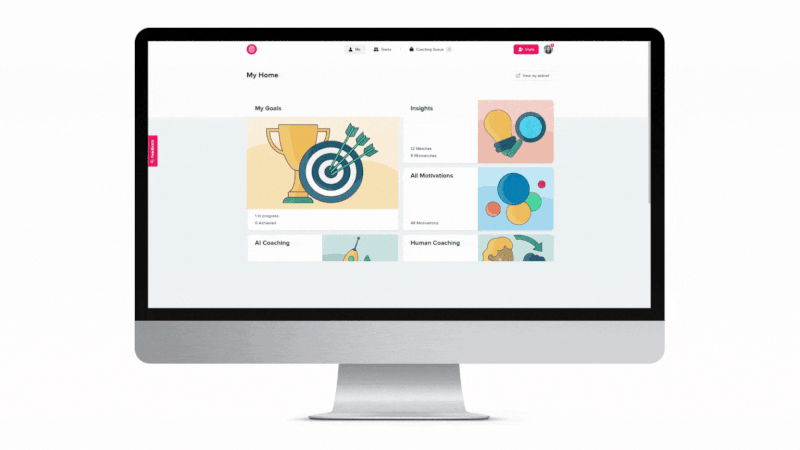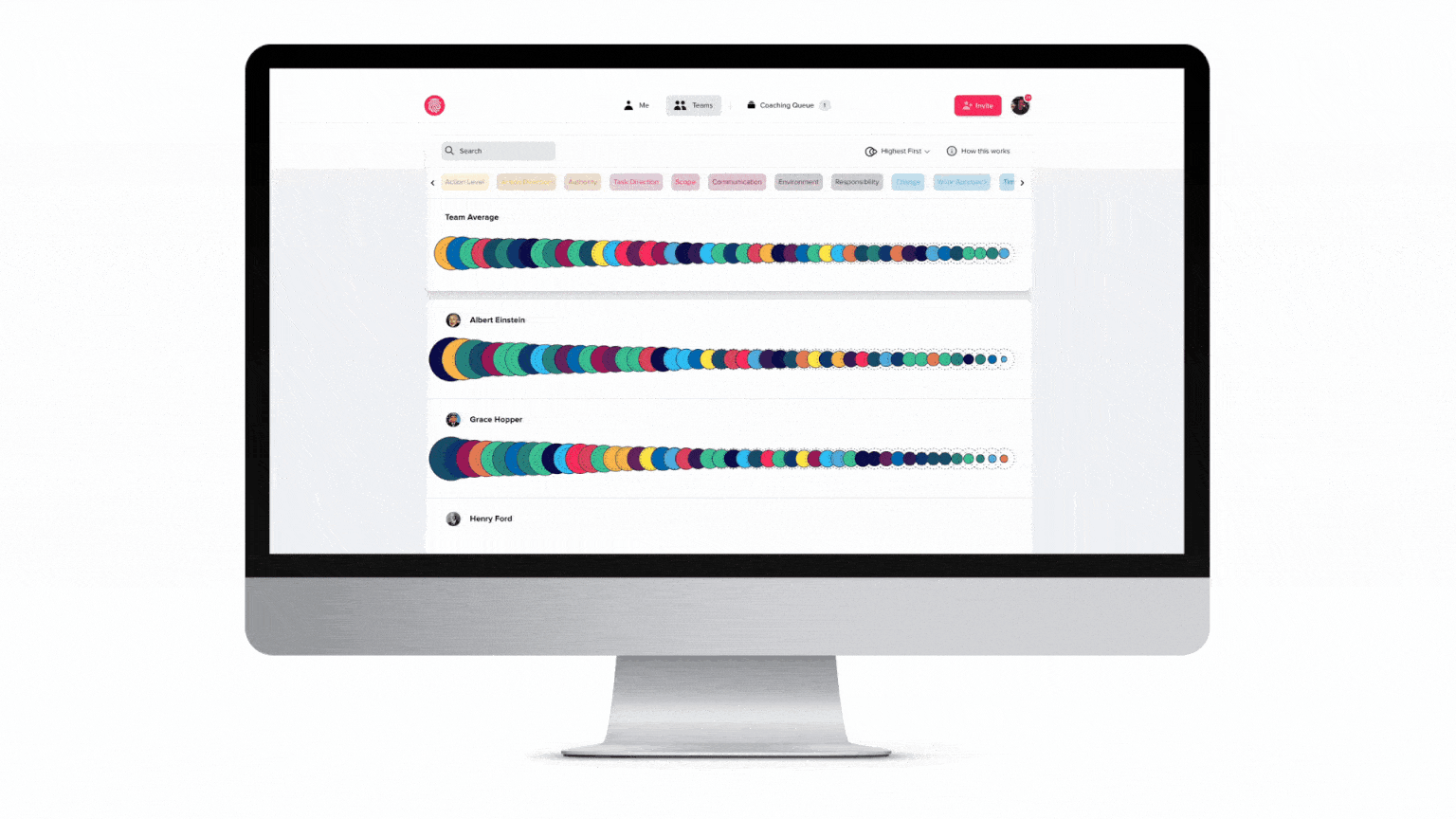The benefits of performance coaching for career success
With the average person spending roughly 90,000 hours at work throughout their lifetime, our careers are a huge part of our daily lives1. Gone are the days when people simply worked to survive. Many of us now strive to find meaning and self-actualization through our careers — and that means being the best version of yourself at work.
- Author
 Emma Norris
Emma Norris

Whether you're an employee seeking career advancement or a business leader trying to get the best out of your people, performance coaching is one of the most effective tools for professional development and growth. Read on for everything you need to know about working with a high-performance coach.
What is performance coaching?
Performance coaching is the process of helping individuals or teams reach their full potential at work. The objective of this is twofold. Not only does it help improve employee retention by helping them thrive, but it also helps organizations become well-oiled machines by using their resources more effectively.
As well as helping with general goal setting and troubleshooting, performance coaches dive deeper into specific areas such as time management, skill development, leadership development, and people management.
In a business context, this has traditionally been a one-on-one, in-person process, where an experienced mentor coaches a manager or executive. However, thanks to the growing field of virtual coaching, this is beginning to expand and scale to employees at different levels.
How is performance coaching different from performance management?
It's important to distinguish performance coaching from performance management.
Performance management (PM) is the process of monitoring and evaluating employee's work, to ensure they're meeting the required standard2. The dreaded performance review is one part of the PM process — but typically, ongoing performance management is designed to help underperforming or unmotivated employees get back on the right track.
On the other hand, performance coaching takes coachees from competence to mastery. That's why many of the coaches who specialize in this area are called high-performance coaches. Think about it as the difference between getting a C or an A+ at school!
What are the benefits of performance coaching?
Wondering why an organization might invest in performance coaches? Well, these statistics about the benefits of performance coaching speak for themselves.
- Seven out of 10 leaders and managers see developing people as one of their primary tasks3.
- Only 26% of employees say the feedback they get helps them do better at work3.
- Only about two in 10 managers intuitively understand how to engage employees, develop their strengths, set clear expectations, and coach their direct reports3.
- 80% of people who have received coaching report positive impacts in areas such as work performance, communication skills, productivity, well-being, and business management strategies4.
- 65% of employees in a strong coaching culture report that they are 'highly engaged4.'
- In a study of 100 executives who received coaching, companies experienced the following benefits5:
- That same study found that the executives also experienced a 77% improvement in working with direct reports, and a 71% improvement in relationships with immediate supervisors. They also experienced a 61% rise in job satisfaction5.
- An estimated 80-90% of management and leadership jobs require the ability to coach6.
- 94% of employees say they would stay at a company longer if it simply invested in helping them learn7.
The implications of these stats for employee engagement and retention are hard to ignore. And, the best part is, Human Resources can help achieve these benefits with Fingerprint for Success. We are committed to democratizing the industry, through accessible and scalable AI-based coaching models.
Who uses performance coaching?
A wide range of organizations use virtual performance coaching, too. From Fortune 500 companies and fast-growing startups to not-for-profits and even universities — any company with ambitious goals to hit will benefit from a business coach. However, there are a few different types and the best type of coaching will depend on your team's needs and goals. Forms of coaching include:
Leadership coaching
Otherwise known as executive coaching, this involves working with executives or managers to maximize their leadership capacity, including leadership strategies for communication skills and EQ.
Team coaching
Coaches can work with both team leaders and members (often simultaneously) to increase harmony, cohesion, and collaboration in the team.
Wellbeing coaching
Another key aspect of high performance is physical wellbeing. If you're not happy and healthy, it's hard to perform at your best in the workplace. So, many top execs and leaders get coached to improve their health, fitness, and energy levels.
Life coaching
You might be wondering, "How is performance coaching different from life coaching or therapy?" Well, while there are some key differentiators, there's also some crossover.
Both models involve taking a structured approach, to work through obstacles and achieve personal and professional goals. However, life coaches tend to take a more holistic approach, in that they can work with you on your relationships and day-to-day life, as well as career goals.
It's also important to note that life coaches are not the same as therapists, either. Therapists are university-trained professionals, who can identify and treat specific psychological conditions. On the other hand, life coaches can work with you on mindset barriers, but they are not permitted to diagnose or treat mental illness. Therapy also tends to center around working through issues from your past, while life coaching is more future-focused.
How a digital coaching platform can help
In the past, a successful coaching program was a privilege reserved for the higher echelons of an organization, such as corporate leaders and directors. That was due largely to the high costs, with a single performance coaching session costing between $200 to $6008. However, this ignores high-potential employees at other levels — who left untapped, will likely become restless and unmotivated and leave.
But, thanks to companies such as Fingerprint for Success, that's all changing. Innovative, AI-based technology makes performance coaching accessible to all employees — from team leaders and members, right up to CEOs. Combining both personal and professional coaching, employees of all levels are empowered to bring their best selves to work. Effective employee performance coaching can help with employee retention and job satisfaction.
The beauty of AI coaching is that you can mix and match different coaching programs, to meet your personal life goals and focus on your professional development. At F4S, we have 11+ different coaching pathways, ranging from multiplying your impact to developing your intuition.
The F4S coaching approach
The good news is, leaders can now leverage powerful AI technology to effortlessly harness their inner coaches. At F4S, the performance coaching process starts with our work style assessment.
Backed by 20+ years of research, its more than 90% accurate and measures 48 motivational traits. Managers can use these insights to learn about their teams, as well as themselves. The assessment is a fantastic tool that uncovers individual motivations, so managers can tap into individual strengths and blindspots — to energize staff, rather than drain them. They can also get a bird's eye view of their entire team, to learn how to best delegate based on skills and work style preferences.

F4S individual dashboard
Furthermore, the assessment makes it easy to identify top talent in your organization. By uncovering their strengths and opportunities for improvement, managers can further cultivate their most valued qualities.
A coaching plan: how to get started with our scalable performance coaching
F4S' online platform not only gives you the tools to get the best out of your employees but can actually facilitate and automate the coaching process. Here's how to get started.
For individuals:
F4S gives individuals a high level of self-understanding, so they can develop the soft skills needed to reach their career goals.
- First, create a free account and take the work style assessment yourself
- Uncover your workplace motivations and blind spots. Your results are based on 20+ years of research, our revolutionary assessment is more than 90% accurate and measures 48 different motivations.
- Set a goal and our AI Coach Marlee will recommend the coaching program that will help you achieve it. More than 90% of users achieve their goals by the end of their first coaching program.
For teams:
Fostering high-performing teams has never been easier. Gain a deeper understanding of your team's dynamics through supercharged data insights.
- First, create a free account and take the work style assessment yourself
- After you complete the assessment, set up your project team and invite each team member
- Team members will receive a link to their assessment via email. Once they take the assessment, they will be able to see their individual results
Once they have completed it, you will be able to use our Insights tool to compare team members’ motivation and communication preferences.

F4S team dashboard
Who can be a performance coach?
In many organizations, an employee's supervisor or manager (unofficially) takes on the role of the performance coach. As leaders, it's their responsibility to understand their direct reports' strengths and ambitions and offer support as they develop and grow.
Unfortunately, only about two in 10 managers intuitively know how to coach their employees in this way3. That means many organizations need additional performance coaches or programs to guide their management teams.
These experts will work directly with a company's managers and supervisors to teach them how to become effective coaches for their employees. The executive coaches coach the supervisors, and then the supervisors coach their direct reports resulting in an all-around high-performing organization.
So, what skills and qualifications are required to be a performance coach? First and foremost, strong coaching skills are needed. Typically, professional coaches will be highly trained and hold ICF (International Coaching Federation) accredited coaching certifications. For high-performance coaching specifically, strong business experience and acumen are typically needed. They may hold an MBA or have experience in running or growing businesses themselves.
What's the goal of performance coaching in the workplace?
As mentioned, a performance coach is someone who takes on a supportive and guiding role to help you reach your full career potential. Through performance coaching, they give people the resources and encouragement they need to excel by doing the following:
- Evaluating an employee's performance
- Identifying performance-related goals and objectives
- Providing honest feedback about areas of improvement
- Monitoring progress in achieving those goals
- Suggesting relevant skills that might be needed
- Offering resources and outlets to refine those skills
In a time plagued with layoffs, cultural shifts, and financial downturns, leaders are increasingly being expected to step into this 'coach' role to guide individual employees through uncertainty. However, many managers aren't equipped with the expertise and knowledge they need to make that happen.
What is the ROI of performance coaching?
With global forecasts predicting stormy financial conditions, it may feel difficult to justify investing in performance coaching. You likely want to have a good idea of ROI, before you open the ever-tightening hip pocket.
Look back at the statistics at the start of this post, and you'll see that performance coaching offers a number of advantages including (but certainly not limited to):
- Greater productivity
- Better quality of work
- Improved customer service and fewer customer complaints
- Increased retention of executives
- Cost reductions
- More profitability
- Positive relationships with direct reports, supervisors, peers, and clients
- Better collaboration and teamwork
- Increased job satisfaction
All of these are good news for an organization. In fact, in one study of a Fortune 500 company, 77% of respondents believed coaching had a significant impact on at least one of nine business measures. Specifically, productivity and employee satisfaction were the most positively-impacted areas9.
Additionally, according to the ICF, 86% of organizations saw a positive return on investment in coaching engagements and 96% of people who had an executive coach said they would repeat the process again10.
Still not convinced? The ICF conducted a global study on coaching and the results will blow you away11:
- 80% of those coached saw improved self-confidence
- 73%: saw improved relationships
- 72% saw improved communication skills
- 70% saw improved work performance
- 61% saw improved business management
- 57% saw improved time management
- 51% saw improved team performance
Pretty impressive, right? But we have to admit — not all coaches can produce these results.
Fingerprint for Success' founder, Michelle Duval, is a pioneer of coaching. She's written multiple books that are used to train coaches around the world today, trained hundreds of coaches herself, and has spent 20+ years researching the science behind human behavior. Her work uncovers the key characteristics that distinguish high-performing teams from low-performing teams.
Duval as helped founders scale their businesses and exit for between $6 million and $1.2 billion dollars. Needless to say: her coaching methods are truly the Gold Standard in the coaching industry!
We've got the data to back it up, too: more than 90% of users achieve their goals within 4-9 weeks of our online coaching sessions — this is way ahead of the results found by ICF. Coach Marlee can be your dedicated performance coach with availability 24/7.
As well as our revolutionary Coach Marlee, we also have human expert coaches available if this is your preference. Our fabulous coaches have the highest level of training available, including accreditations from the ICF. We also have an extensive coaching network with many different areas of specialization, including career coaching, leadership coaching, executive coaching, and health coaching.
Book a coaching session using our (human) coach directory.
How performance coaches help with professional growth
Ready to bring a competitive edge to your professional life? There's a whole range of skills and responsibilities that a performance coach can help with. From mindset and management and productivity, here are some of the key focus areas for your development plan:
1. Leadership skills
Coaches can ask the right questions and get you to think about what you're really trying to achieve when you manage people. They can help you understand and define your leadership style, and equip you with a better toolkit for dealing with different personality types.
Suggested coaching program: Personal Power
2. Communication
Research shows that leaders with effective communication skills provide 47% higher returns to shareholders over a five-year period12. From sharing your vision to providing constructive feedback, coaches can help you develop these indispensable soft skills.
Suggested coaching program: Multiple Your Impact
3. Productivity
The ability to do deep work — defined by Cal Newport as "focusing without distraction on a cognitively demanding task" — doesn't come easily. But, with enough practice, it can become a habit, and the rewards of consistent deep work sessions can be tremendous. Coaches can help build systems and thinking frameworks to make deep work happen more often and for longer.
Suggested coaching program: Goal Catcher
5. Emotional intelligence
Otherwise known as EQ, emotional intelligence is one of the biggest predictors of success in the workplace. While coaching can't teach you to read minds, it can help you become more perceptive of both your own and your team's inner drives and needs.
Suggested coaching program: Increase EQ
6. Creativity
Being able to come up with innovative ideas might seem like an innate skill that some creative souls are born with, but it's actually a systematic thought process that can be taught. Leaders that need a more pioneering skillset can work with a coach to learn strategies for unleashing creativity.
Suggested coaching program: Big Picture Thinking
Where to find a performance coach
So, you're sold on the benefits of high-performance coaching and are eager to partner with someone who can take you (and your company) to the next level. Where do you start?
- Your current employer: Your workplace might have a mentorship program, where a leader in your organization can serve as your performance coach. Or, they could be connected with a third-party coach who could offer support and guidance.
- Your professional network: You likely already have a whole web of professional contacts. Reach out to some of your professional acquaintances to ask if they've used a performance coach or if they've heard of someone who could be a good fit for you. You might be surprised by who is right under your nose.
- Yelp or LinkedIn: Use the search function on these platforms to search keywords such as 'business coaching', 'performance coach,' 'executive coach,' 'leadership coach,' and more. You'll find profiles you can peruse and you can also filter by location if you want to work with a coach in-person. Additionally, Yelp will even show you reviews of each coach so you can hear about other people's experiences.
- Fingerprint for Success: We make effective, personalized performance coaching available to everyone — for free! Create your account to access the world's first AI-powered coach. Coach Marlee will learn about your unique working style and deliver a targeted coaching program, unique to your traits and goals.
References
- Gettysburg College. (2023). Gettysburg College named among 2023 Forbes Best Midsize Employers. Available at: https://www.gettysburg.edu/news/stories?id=79db7b34-630c-4f49-ad32-4ab9ea48e72b
- AIHR. What is Performance Management? Available at: https://www.aihr.com/blog/what-is-performance-management/
- Gallup. (2019). Give Up Bossing for Coaching and Get Better Results. Available at: https://www.gallup.com/workplace/282647/give-bossing-coaching-results.aspx
- Training Industry. (2019). Why You Need a Coaching Culture. Available at: https://www.td.org/insights/why-you-need-a-coaching-culture
- PR.com. (2005). New Study Finds That Executive Coaching Has High Returns on Investment. Available at: https://www.pr.com/press-release/13166
- Grant, A. M. (2009). What Can Coaches Do for You? Harvard Business Review. Available at: https://hbr.org/2009/01/what-can-coaches-do-for-you
- LinkedIn Learning. (2022). The State of Workplace Learning 2022. Available at: https://learning.linkedin.com/content/dam/me/learning/resources/pdfs/linkedIn-learning-workplace-learning-report-2022.pdf
- Arden Coaching. (2022) The Cost of Executive Coaching: What You Need to Know. Available at: https://ardencoaching.com/cost-of-executive-coaching/
- GVA Leadership Development & Coaching. (2017). Executive Coaching: An Executive Briefing. Available at: https://gvasuccess.com/articles/ExetutiveBriefing.pdf
- iPEC Coaching. (2020). What is Coaching? Available at: https://www.ipeccoaching.com/hubfs/What%20is%20Coaching%20-%20iPEC%20Coach%20Training.pdf
- International Coach Federation. (2010). ICF Global Coaching Client Study. Available at: https://www.michalholub.cz/download/ICF-Global-Coaching-Client-Study-complete.pdf
- Pumble. (2022). Communication Statistics. Available at: https://pumble.com/learn/communication/communication-statistics/


